11 Benefits of blue light glasses
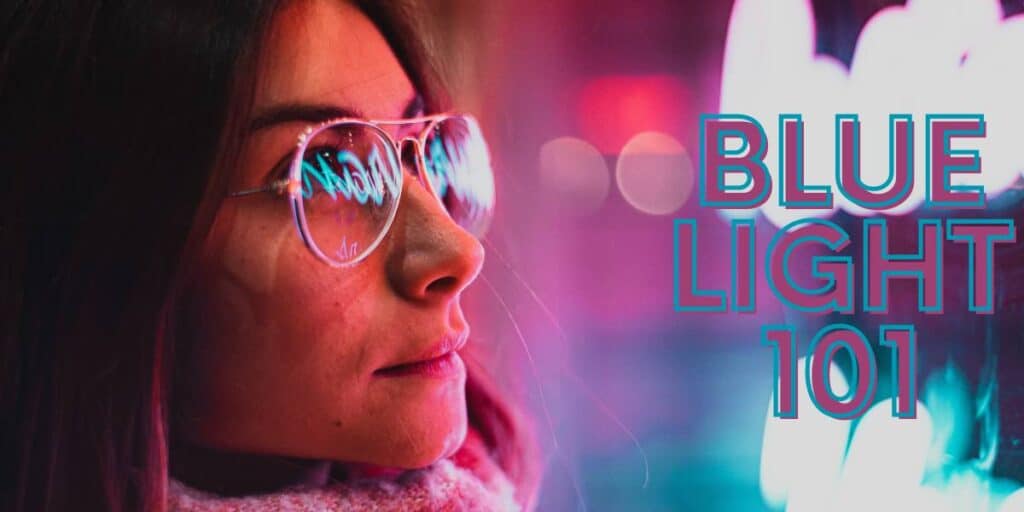
The blue light issues are a real thing guys and the benefits of blue light glasses are not just a fad! Blue light from screens signals your brain to be awake and disrupts your sleep hormone, melatonin. This leads to trouble falling asleep, waking often in the night, light sleeping and not feeling rested upon waking in the morning.
Being a licensed optician, it only made sense for me to touch on this subject. So, sit back, relax, and let me enlighten you on the many benefits of sporting these trendy spectacles.
WHAT IS BLUE LIGHT? THE RESEARCH BEHIND IT
Blue light is a type of high-energy visible (HEV) light that emits from electronic devices and artificial lighting sources. It has a short wavelength, which means it carries more energy than other colors on the visible spectrum.
Blue light is known to affect our sleep patterns, eye health, and overall well-being. The biggest source of blue light is sunlight. However, we are also exposed to blue light through digital screens such as computer monitors, smartphones, televisions, tablets as well as LED lights used in homes, offices, and schools.
We spend more time indoors nowadays than ever before due to technology advancements and societal changes over the past few decades. Studies have shown that too much exposure to blue light can have negative effects on our eyesight. Prolonged screen time can cause digital eye strain or Computer Vision Syndrome (CVS), which can lead to dry eyes, blurry vision, headaches and neck pain.
Another significant impact of blue light is its effect on our circadian rhythm or sleep-wake cycle. Exposure to blue light suppresses the production of melatonin – the hormone responsible for regulating our body.
Blue light at night confuses our circadian rhythm and disrupts our hormones. This leads to less melatonin and reparative sleep, more cortisol and inflammation, all contributing to tumor formation.
So, is blue light bad for you?
Not all blue light is bad. Blue light between 450-500nm is considered good blue light and needed for good health. It boosts alertness, helps memory and cognitive function and elevates mood. It regulates circadian rhythm – the body’s natural wake and sleep cycle. Exposure to blue light during daytime hours helps maintain a healthful circadian rhythm.
Filtering out ALL blue light is NOT a healthy solution. You want to block the bad blue light while allowing good blue light to enter. The graph below articulates what I am trying to say.
The science is definitely available to show that artificial light has been linked to breast and thyroid cancers, obesity, depression, and so many more health problems.
“Artificial light at night is significantly correlated for all forms of cancer as well as lung, breast, colorectal, and prostate cancers individually. Immediate measures should be taken to limit artificial light at night in the main cities around the world and also inside houses.”
https://www.ncbi.nlm.nih.gov/pmc/articles/PMC5454613/
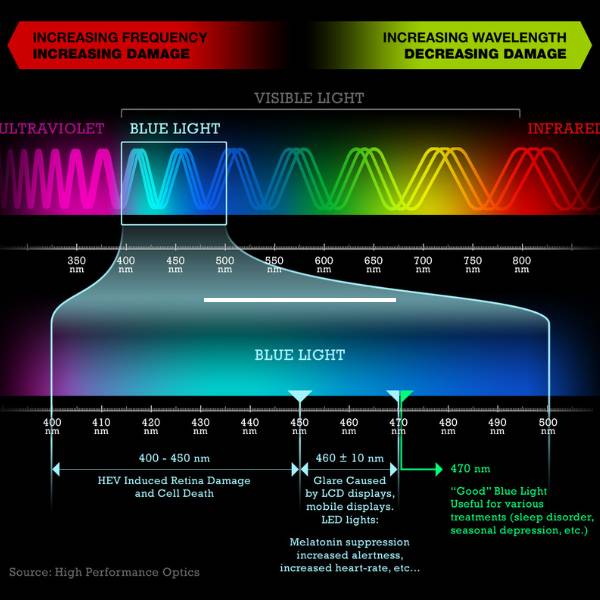
“In this cohort study of 43, 722 women, artificial light at night while sleeping was significantly associated with increased risk of weight gain and obesity, especially in women who had a light or a television on in the room while sleeping”
Association of Exposure to Artificial Light at Night While Sleeping With Risk of Obesity in Women | Lifestyle Behaviors | JAMA Internal Medicine | JAMA Network
SYMPTOMS OF BLUE LIGHT EXPOSURE
Just like different food entering our mouths have different nutritional values, different frequencies of light entering our eyes have uniquely healing and harmonizing effects.
Also, just like we need different types of foods to get a full spectrum of vitamins and minerals that our bodies need to function optimally, we also need full spectrum sunlight, UV light included, to get the full nourishing effect.
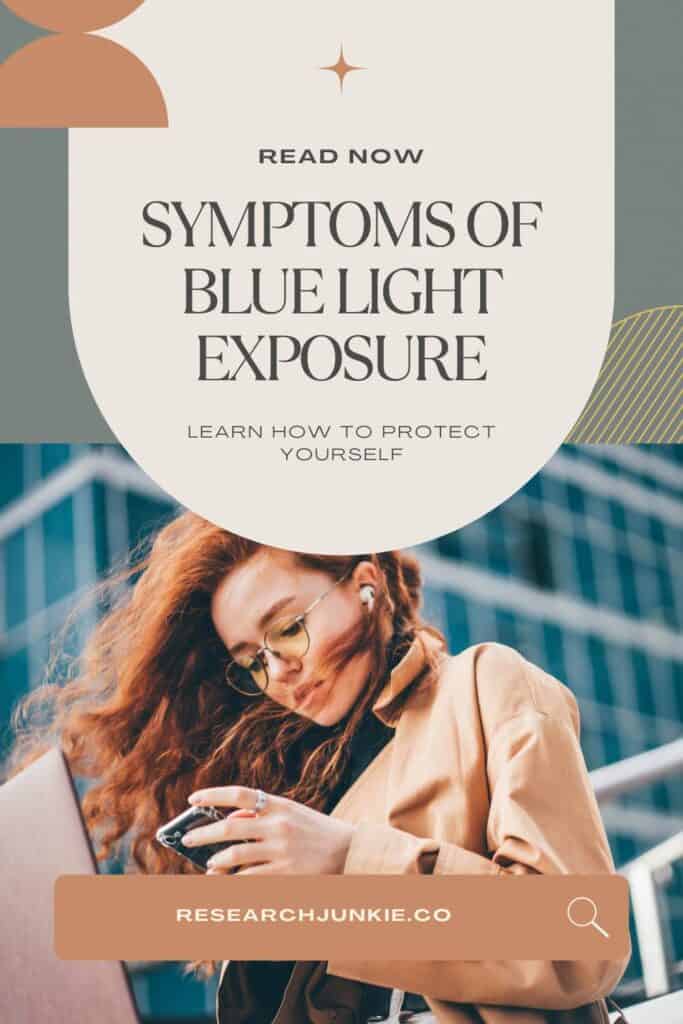
10 Negative effects of UV light:
- Headaches/Migraines
- Ability to cope with stress
- Ability to think clearly/brain fog
- Digestion and food absorption
- Mood changes
- Energy levels
- Immune system and longevity
- Skin health
- Sleep disruptions
- Weight gain
Blue light can even increase insulin and blood sugar levels. Supplementing with melatonin does not prevent blue and green light from affecting all these other hormones.
To avoid the negative effects of the persistent light that is everywhere in our society, you need countless supplements for offsetting the countless negative effects on your endocrine system.
So if you want optimal health, change your light environment. Get more sunlight during the day and block artificial lighting at night.
HOW ARTIFICIAL LIGHT IS DESTROYING YOUR CHILDREN’S HEALTH
Most children now have a smartphone, tablet, laptop, which exposes them to an artificial and incomplete spectrum of light.
Even at school, they are exposed to artificial light via smart boards and fluorescents in classrooms.
Technological development has had multiple benefits for our societies but created a lot of detrimental effects on our health, especially on children such as:
- ADHD and behavioral disorders
- Eyesight problems
- Hormonal imbalances
- Immune system
- Sleep issues
Here’s how to change the light environment for your kids to improve their health:
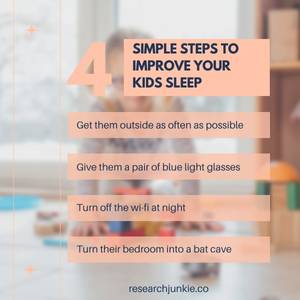
- Sunlight exposure: Get our kid outside in the sun. Take a walk, go to the park or play with them in natural light. This will ensure that they stimulate their own dopamine production to optimize their learning, mood, motivation and energy levels
- Circadian lenses: Make them wear a pair of circadian lenses every time they are indoors under artificial lighting or looking at screens. This will allow them to keep their melatonin levels high to ensure their sleep is deep and rejuvenating.
- Change their light environment: Whenever you can, open a window to let full spectrum of sunlight into the room. Replace LED bulbs and fluorescent lighting in your house, especially in their bedroom, with red/amber or incandescent bulbs to decrease the amount of blue light they are exposed to.
- Modify their screen habits: Lower the amount of time they spend in front of their digital devices. Make them reconnect with the pleasure of being in nature. Establish a screen curfew to turn off all screens atleast 2 hours before bedtime.
- Lead the way: Your children don’t do what you say. They do what you do. The number one driver of human behaviors is mimicking. It’s even more true in children as they develop most of their habits from reproducing yours.
WHEN AND HOW TO WEAR BLUE LIGHT GLASSES
When you are at home and waking up before sunrise wear orange or red-blue blockers around the house. (Orange if you have a lot of things to do & need to see your way around safely.)
If you are up before sunrise and have to drive somewhere then wear yellow while driving. (Never wear red or orange while driving.)
Always try to get morning light in your eyes before screens for your best health and eyesight! At least 5 minutes of sunrise and 5 minutes of UVA (longer if you can). You want to try to let sunlight be the first light that your eyes see each day.
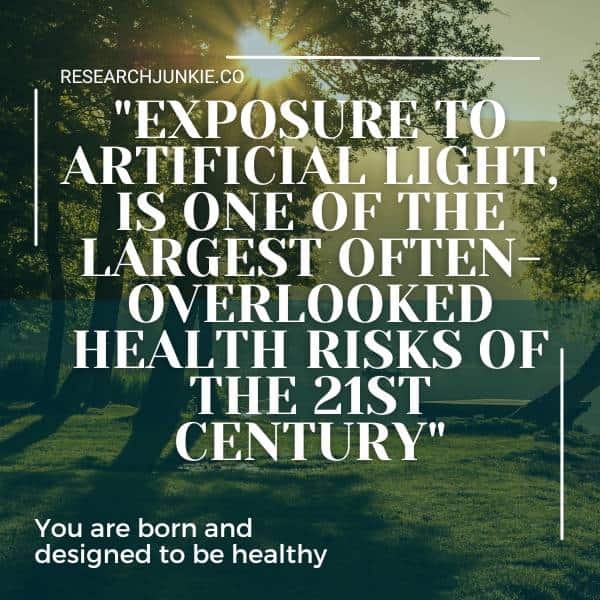
Wear yellow blue blockers when on screens or devices. Take “light breaks” as often as possible to see the sun with bare eyes and keep circadian health strong.
If you are indoors, wear orange blue blockers after sunset. Also consider changing your light bulbs to incandescent or a low kelvin like waveform LED like this brand.
If you are outdoors and walking around after sunset or driving after sunset – wear yellow glasses.
30 minutes to one hour before bed – put on red glasses. If you can only afford one pair of glasses, get red glasses and wear them only when you are indoors (for safety).
You can also use red light bulbs or a red light panel to light your home.
11 BENEFITS OF BLUE LIGHT GLASSES
Here are some of the key advantages of wearing blue light glasses:
- Reduces eye strain
- Might slow and prevent age related macular generation
- Improves sleep
- Improves your moods like anxiety and depression
- Prevents diseases like cancer and obesity
- Increase in energy and focus
- Alleviate headaches
- Balance your hormones
- Improve texture of skin
- Improves dry eye
- Available just about everywhere and very versatile
DOES INSURANCE COVER BLUE LIGHT GLASSES?
Most managed vision care insurances will give you an allowance towards eye glasses. You do have to have a prescription in order to submit to your insurance company.
If you wear prescription glasses and you have vision insurance then you can get blue light blocking glasses. Check to see if your local optician participates with your vision coverage. If they do, ask them about blue light blocking glasses. If you see a skilled optician they will lead you in the right direction on what you need.
THE BEST BLUE LIGHT GLASSES
Here is my top list of NON-RX blue light blocking glasses:
- Orange blue blockers for around the house
- Yellow blue blockers for driving
- Everyday purpose (love this brand because you customize them)
- Orange blue blocker “fit overs” to go over your RX glasses
- Orange and yellow blue blocker “clip ons” for RX glasses
Conclusion
We haven’t been properly told about the dangers of artificial light or the importance of circadian rhythms. This is because, just like food, there is so much money in technology and making us dumbed down and addicted to these devices.
Blue light exposure, especially at night, confuses our circadian rhythms and hormones. Our body does not fully enter its rest and repair mode, which is the time our immune system kills nascent tumors, and our faulty cells undergo autophagy and apoptosis
So make sure to educate yourself and protect yourself!
IF THIS WAS HELPFUL FOR YOU, PLEASE SHARE AND POST A COMMENT 🙂
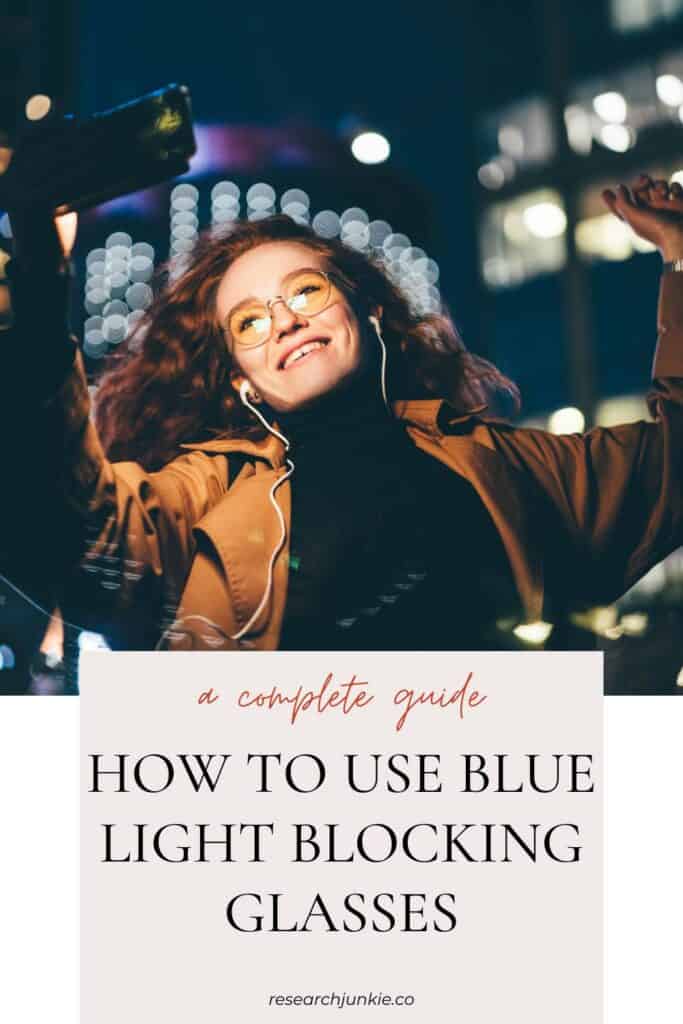
Disclaimer: I am not a doctor and this post should not be taken as medical advice. Please do your own research. Material on this blog is provided for informational purposes only. It is general information that may not apply to you as an individual and is not a substitute for your own doctor’s medical care or advice.
KEEP OPTIMIZING YOUR HEALTH AND CHECK OUT MY LATEST POSTS:
- The Best Detox Baths for Optimal Health
- The Ultimate 3-Day Bone Broth Fast Guide for Beginners
- How to reduce toxic load in your body
- How to Embrace a Holistic Lifestyle
- 8 Natural Pre Workout Alternatives to Boost Your Energy
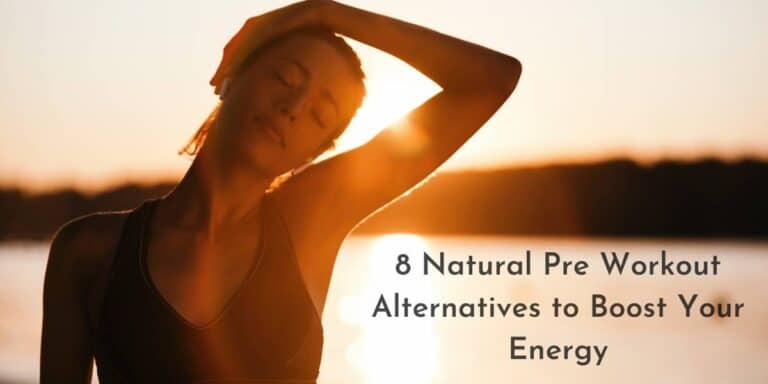


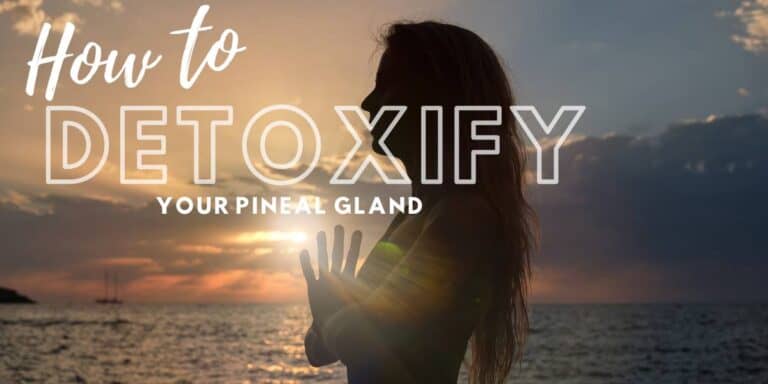


Thanks for this post. My husband and I bought an orange pair a couple years ago and fell out of the habit of wearing them rather quickly. We’ve been trying to put them on in the evenings though just the last couple of weeks. I just bought a pair on Amazon for ‘computer wear’ (clear lenses) and noticed a difference in just a couple days that my eyes just don’t feel as tired and strained when I’m working on my blog at the computer. I’m wondering what kind to get my 13 year old son – because, you know, I have to convince him they are comfortable and important to wear but not spend a fortune either. Any suggestions?
The orange pairs are great for indoor use! Some benefit from a clear blue filter like yourself. Most kids on a regular basis would benefit greatly from a clear blue filter lens. I really like the brand Knock-a-around that I suggested on here simply because they have a cool feature where you can customize a pair. I think that is a great option for kids because if you involve them in the customization, they will most likely be more prone to wanting to wear them!
That video is awesome! Thanks! We used to have a red light bulb in our bedroom but I don’t know where it went so we need to get our evening set up ready again!